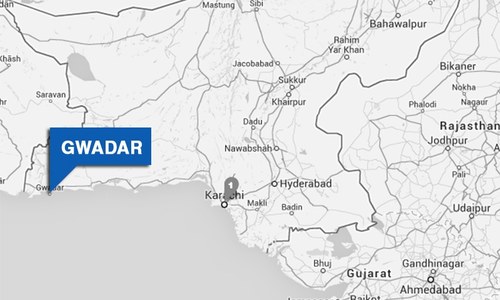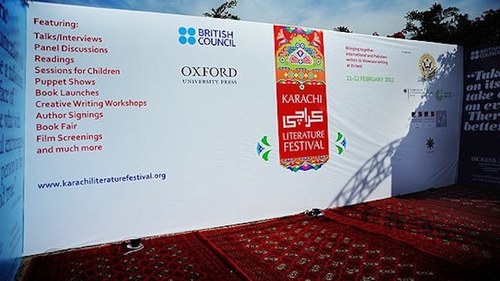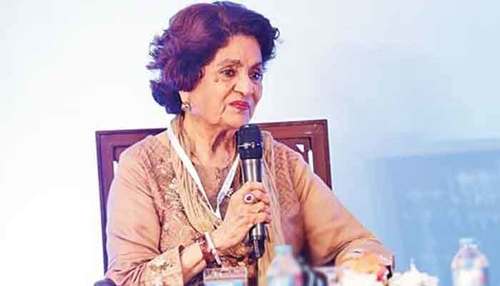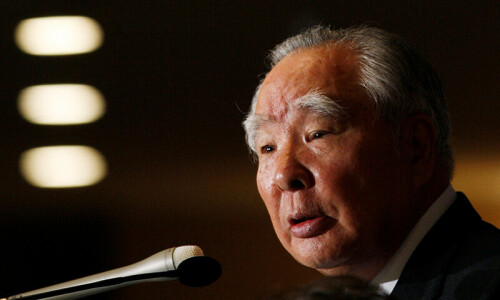KARACHI: When the last iteration of the Karachi Literature Festival (KLF) took place in 2020, no one had an inkling that a year later words such as ‘online’ and ‘digital’ would be used by its organisers. The coronavirus pandemic had hit closer to home, the first case had just surfaced and there was palpable concern for everyone’s safety in the air. But the event went on successfully.
On Friday, the three-day 12th Karachi Literature Festival began at the Beach Luxury Hotel but with the emphasis, by those who run it, that this time around it’s going to be online. Understandably so.
The sessions did take place on Friday in which some speakers participated physically and others from across the computer divide. But then, the shocking news of the sudden demise of writer Haseena Moin on Friday morning enveloped the opening ceremony in gloom. It was thoughtful of the festival organisers to have a minute’s silence in her honour before the programme kicked off.
‘Great tragedy for literary world’
Proceedings began with Oxford University Press managing director Arshad Saeed Husain’s welcome speech. He started his address by acknowledging the passing of Ms Moin saying it’s a great tragedy for the literary world.
US-China rivalry will come to West Asia, says Vali Nasr
With respect to KLF, he told the audience comprising media persons and guest speakers that there was an air of festivity in the previous year when artists and writers engaged in debates. This time around they did consider having the festival open to public, but the third wave of the virus came and they could not take chances with people’s lives.
He mentioned this year’s theme is ‘Imagining New Frontiers’.
Bank of Punjab CEO Zafar Masud said he always wanted to contribute to the festival.
Getz Pharma MD Khalid Mahmood congratulated the organisers for arranging the event in difficult circumstances.
Consul-General of France in Karachi Didier Talpain said he was a long-time supporter of KLF.
British Deputy High Commissioner Mike Nithavrianakis was the guest of honour on the occasion. He said when we think of KLF the minds always think about Karachi, about the fabulous crowds that flock to the hotel every year, the opportunity to brows bookstores and the mix of people from all backgrounds. He prayed for the day when human interaction will return.
After the speeches prizes were given. The prize for the best book in English fiction went to The Miraculous True History of Nomi Ali by Uzma Aslam Khan. The best book of Urdu poetry was won by Armaghan-i-Pak by Dr Aslam Ansari. And the prizes for the best books of Urdu prose were given to Matn Kucch Gumshuda (fiction) by Sami Ahuja and Sher, Sheriyat Aur Fiction (criticism) by Safdar Rasheed.
The awards were followed by a performance by artist Kaif Ghaznavi to a nazm by Fahmida Riaz.
‘Technology is changing the nature of warfare’
Eminent scholar Dr Vali Nasr was the keynote speaker. He spoke online. He said the festival’s theme is an important one. We are at a pivotal moment in world politics. The Muslim world and Pakistan will have to move forward in this new environment and understand the opportunities and challenges that it presents. It is a critical moment because some very important structural shifts have happened in the last three to four years in the world. Some important regional structural shifts put the region and the world in a whole new context.
Dr Nasr said after several decades of the unipolar moment in the world where the US was the dominant force and global economics was about integration of all the economies into a single global market, things have changed.
“We’re now seeing a change in that structure, and that change is essentially associated with the rise of China. China itself benefitted from that unipolar period. During that period China was able to grow at an exponential rate below the geopolitical radar to gain the great power status, becoming the world’s second largest economy.”
He argued now we’re entering a period where the US and China see each other as adversaries. The competition is most intense in East Asia, Southeast Asia but ultimately it will come to West Asia.
Pandemic and poverty
Dr Nasr said the second important aspect that he’d like to touch upon was the pandemic. He pointed out it’s a once a generation event. It has had a devastating impact on the world order. It has devastated economic growth in the West and the countries that rely on it. It’s going to create a certain degree of poverty across the world. The pandemic has changed things in other ways as well. It has created new kinds of relationships between countries. It’s a major challenge to developing countries because of the nature of their economies.
Dr Nasr said another important development is the technological change. The past few years have seen opening up of new frontiers that weren’t there before. The question of cybersecurity is becoming a problem. Technology is also changing the nature of warfare, he added.
Published in Dawn, March 27th, 2021














































